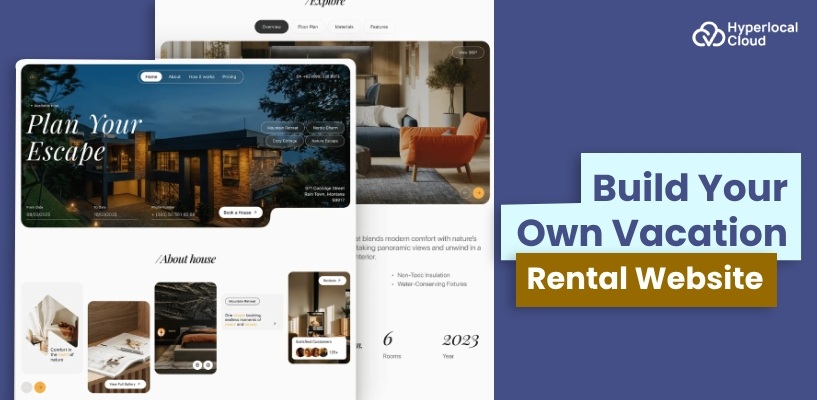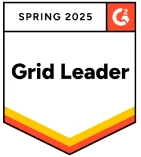Build Your Own Vacation Rental Website

Everyone loves to travel and explore new locations in today’s digital landscape. People want to stay at a nicer place to make their vacation good. Most people book their apartments, villas, tree houses, etc. in advance. Rental space gives a unique voice and space to your trip. Consider yourself an entrepreneur, and you will be able to start an online real estate enterprise—a perfect business where potential guests can find you easily. Thus, creating a dedicated website is necessary to expand your business. So it is simple to say that hosting, advertising, and selling accommodation is easy, but it’s not.
According to Statista, the vacation rental market is expanding and will reach US$105.71 billion globally in 2025. It will grow at a CAGR rate of 4.40% from 2025 to 2029. By the end of 2029, it is believed to be approximately US$125.58 billion, increasing by 78% of the total revenue.
What is a vacation rental website?
A vacation rental website is an online platform that helps guests book short-term rental living spaces such as apartments, houses, tree houses, condos, cottages, etc. These websites offer information about the property, including photos, descriptions, availability, booking costs, and so on.
A website allows visitors to make reservations, check feedback, analyze the cost and space of the property, and more. Some examples of vacation rental websites are Booking.com, VRBO, Expedia, Agoda, and Airbnb.
Start Building Your Dream Rental Site Today
Essential features to build a vacation rental website
To consider the best operation and improve user experience, vacation rental websites need a few key components. This leads towards effortless browsing, which helps in numerous features:
Admin Dashboard
It offers a centralized hub for checking listings, bookings, and financial data, streamlines operations, and improves efficiency.
Property Listings
A vacation home rental website provides thorough property listings, including images, descriptions, features, and costs. When the listing is clear and appealing, guests are likelier to book and trust the platform.
User Profiles & Accounts
A good vacation rental website handles reservations, payments, and correspondence. Both visitors and property owners ought to have individual accounts. This enhances platform engagement and user experience.
Search Filters
Users must be able to filter homes on the website by amenities, dates, price range, and location. You can develop travel apps like Booking.com to make it easy for users to locate rooms that meet their unique requirements.
Availability Calendar
A vacation home rentals website provides a calendar that displays open and reserved dates for hosts and guests. This prevents duplicate bookings and helps to expedite the booking process.
Interactive Maps & Nearby Attractions
Offering detailed information on neighbourhoods, local amenities, and cultural hotspots helps users reach places based on distance.
Payment Gateway Integration
When creating a room rental website, integrate safe payment options like e-wallets and credit cards. This guarantees seamless transactions and fosters confidence among visitors and property owners.
Reviews & Ratings
Potential visitors can learn about a property’s quality from user-generated reviews and ratings on a vacation rental website. Positive reviews can significantly influence booking selections.
Custom Cancellation Policies
Create rules that allow hosts to choose from several cancellation policies or even create custom policies to offer flexibility to hosts and travellers.
Mobile Responsiveness
The website needs to be mobile-friendly because many people visit it from smartphones. Businesses can build an app like VRBO for all devices to guarantee a seamless browsing and booking experience.
Messaging System
An integrated message system allows for direct communication between property owners and visitors.
Additional features to include in a vacation rental website
While considering AI agent tools and enhancing your website’s performance, emphasize features that affect users.
AI Text Assistant
It helps transform and change elements of your website, making the writing process easier and smoother. Along with the guidance, it elevates the content quality without beginning from scratch.
AI Design Assistant
This naturally chooses the best design option, which ensures the site looks elegant and professional. Suitable colour contrast, design, and other elements for a polished look.
Real-Time Query Resolution
Implement a chat-based assistant that addresses common inquiries and booking questions instantly. This assistant will help create personalized recommendations based on user profiles.
Smart Contracts
Use smart contracts to automate rental agreements, which ensures compliance with predetermined terms such as deposit refunds, cancellation terms, check-in/check-out details, etc.
Ready to Go Live? Let’s Build Your Site Together!
Best Vacation Rental Websites
These platforms set benchmarks in the industry. Understanding their strengths helps you build a competitive advantage. These are some of the best rental marketplaces that help in multiple ways:
Airbnb
A pioneer in peer-to-peer vacation rentals, Airbnb is known for its community-based listings, adaptable cancellation policies, and rich user-generated content like reviews and host stories. This is one of the best rental websites, connecting travellers with hosts. It offers numerous unique accommodations, from flats to beautiful treehouses. Thus, an app owner allows the facility to book a short-term apartment. This helps with flights, hotels, and rentals.
HometoGo
It is a hybrid marketplace that helps book on-site or search for the best vacation deals. This offers AI-powered recommendations, an easy booking feature, and a flexible search option, which helps in the broader reach of the audience and customer support.
Expedia
Expedia is one of the world’s leading online travel agencies (OTAs), known for its comprehensive offerings beyond vacation rentals. Travelers can find and book properties like apartments, houses, and resorts. The platform facilitates bookings for flights, hotels, car rentals, cruises, and vacation packages, attracting many travelers.
Agoda
It is popular in Asia-Pacific and includes numerous features such as instant booking, strong mobile UX, and last-minute deals. This is considered the best vacation rental website, which helps hotels by offering booking services in Asia and international markets. It emphasizes competitive pricing and depends on other frequent discounts.
VRBO
Established in 1995, VRBO focuses on whole-property rentals and caters to families and large groups. It offers advanced booking tools, calendar sync, and property protection. Consider the best rental application, which specialises in family-friendly vacation homes and their entire properties. It connects owners directly with travellers for short-term rental opportunities. It is known for being the best and ideal for families and groups.
How to Build Your Own Vacation Rental Website?
Hire our developers to build the best vacation rental website, as Hyperlocal Cloud Inc. makes your business unique in this competitive market. Following are some of the compelling points to consider:
Do in-depth market research
After analysing the gaps in the current market, it is crucial to manage a similar platform that is not fully addressed. In-depth research helps to understand the needs and preferences of numerous traveler demographics, giving a suitable idea for building an app. Identify your niche—luxury rentals, pet-friendly stays, eco-lodges, or urban apartments—which helps you analyze competitors like Airbnb and VRBO.
Develop features
Create a unique feature set for a user-friendly website that helps create an intuitive interface and seamless booking experience. Incorporate advanced search filters for AI-driven recommendations that will make changes according to clients’ preferences. To improve your application, outline core modules like property listing management, user profiles, booking engines, calendar syncing, secure payments, and admin dashboards.
Grab the right tech stack
Before choosing any technology stack, consider the product or service you need to develop. The particularity is in the context of size, complexity, and business goal. Considering the project requirements is essential, as it helps choose an efficient, secure tech stack that facilitates long-term maintenance and growth.
Create user-friendly UI/UX
Clarity, an intuitive navigation system, and consistency are prioritized, which helps in cross-platform incorporating user feedback for better improvement. Invest in a company that creates user-centric designs and better experiences for digital products such as websites, apps, and software.
Development & Integration
This phase involves building the website’s structure using web development technologies like HTML, CSS, and JavaScript, or using CMS platforms like WordPress. Integration includes connecting booking engines, payment gateways, calendars, and third-party services (e.g., Airbnb sync) to ensure smooth functionality, seamless user experience, and secure transactions.
Deployment & Launch
After development, the website is uploaded to a web hosting server. Final testing ensures all features work correctly across devices. Domain setup, SSL installation, and speed optimization are completed. Once everything is verified, the site goes live, and promotional activities attract visitors and drive initial bookings.
Marketing
Leverage social media and influencer partnerships to boost the brand visibility and credibility among travelers. Ensure that the platform includes comprehensive travel guides and resources to assist travelers in planning their trips.
Ongoing support
Stay adaptable and be ready to evolve your business model in response to changing travel trends and consumer behaviors. Prioritize data security and privacy to build trust with your users. Consider sustainability and eco-friendly travel options to appeal to environmentally conscious consumers.
Tech stack to create a successful vacation rental website
Creating a successful vacation rental website requires a well-thought-out tech stack to ensure high performance, scalability, and a user-friendly experience. Here’s a breakdown of the essential technologies you should consider for building such a platform:
| Aspects | Tech Stacks |
| Front-end | React Native, Flutter, React, and Vue.js |
| Back-end: | Python, Node.js, Ruby on Rails, Laravel (PHP) |
| Cloud platforms: | AWS, Azure, Google Cloud |
| Design | Adobe XD, Sketch, Figma |
| Database | MySQL, MongoDB, PostgreSQL |
| Payment Gateways | PayPal, Stripe, Authorize.net, Braintree, and Payoyo. |
How to Market Your Vacation Rental Website
Reaching the targeted audience is essential to maximize the bookings. Here are numerous marketing strategies to boost your vacation rental website:
Use Social Media to Drive Traffic
Consider all potential guests on social media platforms like Instagram, Facebook, WhatsApp, and Pinterest, to engage posts about attractions, activities, and events to enjoy.
Optimize a Website for Search Engines (SEO)
Implement SEO best practices to improve your visibility in search engine results. Research relevant keywords that potential guests might use to find vacation rentals in your area and incorporate them naturally throughout your website content.
Leverage Social Media
Share engaging content using photos, videos, and local tips on platforms like Instagram, Facebook, and TikTok.
Choose local businesses
Collaborate with local businesses to promote each other’s services, which can also help attract nearby attractions, events, and activities.
How to choose the best vacation rental website
Choosing the best vacation rental website depends on several factors, such as your destination, budget, desired amenities, and the type of vacation you’re planning. Here are some tips to help you choose the best platform for your needs:
User-friendly
Look for websites with straightforward navigation, easy search filters, and a simple booking process. A clean design ensures you can find and book accommodations quickly without confusion.
Mobile friendly
Choose sites that are optimized for mobile use, ensuring smooth browsing, easy reservation, and full functionality on your phone, offering flexibility and convenience when booking on the go.
Cost-effective
Seek platforms offering competitive prices, discounts, or price comparison tools. Look for hidden fees, flexible cancellation policies, and membership rewards to ensure you get the best deal possible.
Want More Bookings? Build a Website That Converts
Things to include in a vacation rental website
Creating a vacation rental website requires a combination of functionality, aesthetics, and user-friendly features to ensure guests can easily browse, book, and enjoy their experience. Here’s a comprehensive list of things to include:
Booking Engine: Adding a direct booking engine to your site lets guests book your place instantly, helping them filter by dates and amenities. It also helps manage reservations and walkovers.
Sleek Interface: Keep your vacation rental website design clean and elegant, which will reduce the bounce rate, improve navigation, and fulfil users’ needs.
Key Pages: Your vacation rental website must have a booking engine, accommodation and amenities info, contact details, an about us page, FAQs, and a blog. Include social media links and ensure the content is engaging and reflects your brand.
Contacts: Provide full contact details and a form for easy access on your Contact Us page. Also, add a mobile number and email at the top of the page, with available contact hours.
High-quality Photographs: Visuals are the primary key to a successful vacation rental website. Highlighting a rental’s luxury and uniqueness helps to showcase its great looks.
Terms and Conditions: Make sure you have a comprehensive terms and conditions document for your vacation rental, which you can include in your website.
Cost to consider for vacation rental website development
The cost may vary according to client customization needs, which range from $5,000 to $15,000. This may include numerous factors such as domain registration, website design, SEO optimization, and development. The rest depends on the owner’s needs, which depend on the complexity of the website and desired features.
- Domain Registration
- Web hosting
- Website design and development
- SEO optimization
- Maintenance fees
Conclusion
Building your own vacation rental website may require time and effort, but the rewards are well worth it. You’ll have more control over your brand, avoid third-party platform fees, and have the opportunity to create a more personalized experience for your guests. By choosing the right platform, adding essential features, and promoting your website effectively, you can make a powerful tool for your vacation rental business that drives direct bookings and boosts revenue.





